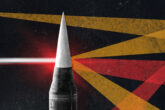February 02, 2021
Duyeon Kim on South Korea’s Foreign Policy Priorities
South Korean President Moon Jae-in faces an unenviable foreign policy environment heading into the final year-plus of his presidency. North Korea remains utterly impassive in the face of Moon’s outreach; a new cold war is looming between South Korea’s most important economic and security partners; and tensions with Japan over historical and legal issues are mounting. Meanwhile, South Korean politicians are starting to position themselves for the Seoul and Busan mayoral by-elections this April – not to mention the presidential election in 2022.
In this interview with The Diplomat, Duyeon Kim, adjunct senior fellow at the Center for a New American Security, discusses South Korean foreign policy – North Korea, the U.S., and beyond – as the 2022 presidential race slowly begins to heat up.
The odds are greatly against President Moon.
In his New Year’s press conference, President Moon continued to stress his hopes for a return to inter-Korean meetings and summits. North Korea, however, doesn’t seem as receptive. What are the prospects for inter-Korea relations in the final year-plus of Moon’s term?
The odds are greatly against President Moon. North Korea has made it clear for a long time that it’s not interested in Moon’s style of inter-Korean projects and meetings. In his Workers’ Party Congress Report, Kim Jong Un criticized Moon for making “nonessential” offers to cooperate on the pandemic, humanitarian issues, and joint tours. But Moon reiterating those again in his New Year’s press conference led to Kim’s sister, Kim Yo Jung, slamming Moon for basically being clueless. Pyongyang first wants Seoul to stop all combined military drills with the U.S., refrain from procuring high-tech conventional military equipment for South Korea’s defenses, enact a leaflet ban as South Korean law, and behave as North Korea’s mignon and provincial government. Only then, according to North Korea, will Pyongyang consider normalizing inter-Korean relations.
Read the full article from The Diplomat.
More from CNAS
-
Trump Administration Realises That The Tariff Strategy Has Backfired: Lisa Curtis
Trump administration realises that the tariff strategy has backfired, says Lisa Curtis, senior fellow and program director at the Center for a New American Security.Watch the ...
By Lisa Curtis
-
Ep 187: Richard Fontaine on the “Reverse Kissinger”
Richard Fontaine, CEO of the Center for a New American Security (CNAS) and co-author of No Limits? The China-Russia Relationship and U.S. Foreign Policy, joins the show to dis...
By Richard Fontaine
-
A Stroll Through the Indo-Pacific, the Most Important Region in the World
In this episode, we get into what’s driving the Indo-Pacific’s security dynamics, from China’s threats to Taiwan to AUKUS and the Quad to stability (or lack thereof) on the Ko...
By Lisa Curtis
-
Assessing China’s Nuclear Decision-Making
China’s rapid nuclear buildup is raising questions about how the country makes decisions related to nuclear weapons. This policy brief analyzes that trend by presenting three ...
By Jacob Stokes




